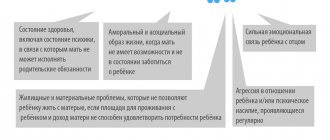Since childhood, each of us believes that he, despite any examples around him, will have a happy and complete family. Alas, this dream does not always come true. And what’s even worse is that parents often become real enemies after a divorce. When it is not possible to come to an amicable agreement with your dad, you have to remember the rights and responsibilities of the father after a divorce.
What are the responsibilities and rights of the child’s father after a divorce? Lawyers give the answer.
Pexels Photos
What are parental rights
This is the name given to the powers of parents in relation to minors. They consist of the rights to communication, education and upbringing. Parents are also official representatives of their offspring, and therefore have the right to protect their interests. In the future, if the father and mother are unable to work, they have the opportunity to receive maintenance from the child.
Rights to a child go hand in hand with responsibilities. If parents do not fulfill their responsibilities in good faith, they may also lose their rights.
After divorce
Divorce does not mean that the spouse leaving the family is deprived of his rights to his offspring and may not fulfill his duties towards them. The father, even living separately from the child, retains all his rights and obligations. And formally they are no different from their mothers. The parent who is constantly with the child has more opportunities to use them, but if desired, the situation can be corrected - peacefully or through the courts.
Limitations on the rights of father and mother
The court can restrict parents. This is practiced due to negative influence from the father or mother, which may be due to an immoral lifestyle or mental illness. If a parent’s behavior affects the well-being of minors and their psychological state, then he may be limited in contact with them. This does not cancel parental responsibilities.
Kidnapping
When wondering what rights a father has after a divorce, some men may assume that they can simply steal a child from their mother, and with impunity. This is a big misconception. In Russian legislation there is no concept of stealing one’s own child, but often fathers who do not agree with the court’s decision on the cohabitation of mother and child may decide to keep the child by force. It is very difficult for women to resist such actions.
Recently it was proposed to establish a type of criminal liability for family kidnapping. Legislators propose to fine the parent in the amount of 50,000 rubles for the first abduction. If this happens again, it is proposed to prosecute under Article No. 126 of the Criminal Code of Russia (“Kidnapping”).
Neither the rights of the mother nor the rights of the spouse should be infringed during a divorce. Every parent has the right to continue to communicate with their child legally. If a child remains with the mother, then she should not interfere with the father’s meetings with the baby or teenager. Psychologists say that after a parent’s divorce, a child feels a real loss, a change from a familiar life to an unknown one. The rights of parents after divorce always smoothly turn into responsibilities. The main goal of mom and dad should be care, attention and love for their own child. It is important, even in the most difficult situation, to maintain common sense and direct all efforts to improve the child’s living conditions.
Father's rights
After a divorce, all rights and responsibilities remain, even if the parent does not live with the son or daughter. Only a court can limit a father’s rights if there are special circumstances. It is worth clarifying what rights the biological father has to the child to make sure there are no infringements.
For information
Hospitals, kindergartens and schools cannot hide information about their son or daughter from a parent. They must provide information about:
- state of health;
- treatment if there are diseases;
- academic performance;
- features of training;
- material support, etc.
An exception may be cases when the institution's staff have reason to believe that the father's possession of this information could be harmful.
For communication
It is advisable that the parents themselves determine the order of communication between their offspring and each of them. But sometimes an agreement cannot be reached. Then the court determines how the child’s communication with his parents will be structured. The hearing is carried out upon receipt of an application from a father who requires permission to interact with his son/daughter, or from a mother who seeks to limit this interaction.
During the trial it is determined:
- days on which the minor will see his father or visit him;
- a place where the father will meet with the child;
- limits of interaction (the parent may be allowed to meet with the offspring, take him over for the weekend or for a longer period);
- organization of meetings (meetings are possible at any time, on certain days or by prior arrangement).
When one of the parties goes to court with certain demands, the other party can do the same by putting forward counterclaims.
Consent to travel outside the Russian Federation
According to the law, it is impossible for a child to leave the Russian Federation without the consent of the father. Minors can travel abroad only with both parents. When traveling abroad with only one of them, you must obtain written permission from the second. A father can prohibit a child from traveling to another country if he believes it is unsafe.
The mother's rights to the child allow her to go to court and demand permission if the refusal is not due to objective reasons. In this case, the court may oblige the ex-spouse to give consent.
Permission to change surname
Sometimes it becomes necessary to change the surname of a minor - for example, if his mother returned her maiden name after a divorce, then difficulties may arise due to the differences. Therefore, it is more convenient when the child bears the mother’s surname. But such a decision cannot be made unilaterally. The father must give permission for this procedure. It is not required only if:
- incapacity;
- deprivation of parental rights;
- missing.
In these circumstances, a parent may change the minor's last name without the consent of the other party. But if he is already more than 10 years old, then his consent will be required.
Interests of the minor
To begin with, it should be noted that, according to the current legislation, there are no clear principles that would give grounds for a minor to remain exclusively with his mother. According to the norms, such a person can live with either parent.
That is why in court proceedings they are always guided by the interests of the baby, and then everyone else. Another thing is that in most cases it is the mother who remains with the child, and the father becomes “Sunday.” Although there are exceptions to the rules.
According to the Family Code, parental rights are the only mutual rights of former spouses, which do not lose their force with the fact of divorce. Everyone must still perform their assigned functions within the limits of their capabilities.
And by the way, getting a divorce if you have a baby is only possible in court, even if each party does not make any claims against each other.
The decision should make it clear who he stays with. Any controversial issues that arise in the process of resolving issues of raising children are considered within the framework of civil proceedings (CCP).
Issues that are resolved in court in the context of raising common children:
- Who stays with whom?
- Where will the baby live?
- The responsibilities of the party not living with the child are determined;
- The capabilities of such a subject are also prescribed, defining the frequency of possible visits, possible options for joint recreation, leisure, the use of educational measures, etc.;
- The amount of future alimony and the algorithm for paying it are calculated;
- The issue of transferring part of the property is being resolved.
Of course, there may be many options for issues that can be considered. As practice shows, everything depends not even on the order issued, but on the very atmosphere between the spouses. It is easier to agree on some nuances on your own.
Is it possible to prohibit a father from seeing his child?
During normal interaction between a father and his son or daughter, no one has the opportunity to interfere with their communication. Restrictions may be imposed by the court in the following circumstances:
- threat to life, development and health posed by the father;
- abuse, violence or threats;
- failure to fulfill duties;
- alcohol/drug addiction;
- abuse of rights.
When considering the case, the court may set limits on the time of interaction or limit the father’s rights. But this is only possible if there is evidence of unacceptable actions.
About the peace agreement
In order to resolve issues related to the father’s rights to the child after a divorce as gently as possible, spouses are recommended to go to a notary and conclude a peace agreement.
They usually indicate:
- place of residence of the children and the parent with whom they will live;
- meeting schedule with all the nuances;
- alimony that the man will pay.
This approach is used extremely rarely. Few people will yield to their spouse in the event of a divorce in certain matters.
Abuse of rights
If there is such a violation, the parent may be deprived of rights to the child. This term refers to the commission of actions that are harmful and even dangerous for a minor, his life, health and development. These include:
- obstruction of learning;
- formation of antisocial habits;
- prohibiting interaction with the other parent or attempting to provoke conflict.
A lawyer should help determine whether certain actions constitute abuse, since it is difficult to determine on your own. Such behavior can only be influenced with the help of the court, if it can be proven that rights have been abused.
Deprivation and restriction of parental rights
Parents have certain rights and responsibilities towards their children. If they commit serious violations, their rights may be limited or even deprived of them.
Restrictions are imposed on parents whose actions are dangerous to the life and health of their children. However, their actions are not yet serious enough to take serious measures. In fact, this is a temporary ban on communication with your son or daughter.
Rights can be completely revoked for:
- failure to fulfill obligations towards a minor;
- abuse of rights to it;
- antisocial lifestyle;
- cruel treatment;
- committing a crime against a child or spouse.
The following may insist on deprivation of parental rights:
- second spouse;
- close relatives;
- prosecutor;
- child protection.
To make a decision, the court must evaluate the evidence presented and study the situation in the family. But the most important thing is to take into account the interests of the child himself.
Consequences of deprivation
If the court makes such a decision, then the parent loses all rights to the offspring. He cannot participate in his upbringing, receive information about him, participate in his life and communicate. Also, the father or mother loses the opportunity to receive maintenance in old age from his son or daughter. In addition, six months after the court decision is made, the child can be adopted. But at the same time, the parent’s responsibilities for financial support are not relieved.
Children's surname and divorce
A child's surname can be changed after a divorce, but only with the consent of the father. Accordingly, if dad is against it, mom will have to come to terms with the fact that her children will keep the “old” surname.
There are circumstances that do not require the father's consent to change the child's personal data. For example, these include:
- deprivation of father's parental rights;
- availability of a court decision allowing adjustments to be made to the child’s personal data.
Important: courts rarely refuse to allow mothers to change their child’s last name to their own. Therefore, the described right of the father is often easily circumvented and ignored.
Legislative regulation
All features of interaction between parents and children are regulated by the following legislative documents:
- UN Convention on the Rights of Children.
- Constitution of the Russian Federation.
- Federal Law “On Acts of Civil Status”.
- Family Code of the Russian Federation.
After a divorce, the parent leaving the family does not lose his rights to the children. He can communicate with them, participate in their life, influence its quality, etc. But it should be remembered that the interaction must be without violations, otherwise the court will impose restrictions. The same is possible if duties are not fulfilled.
Responsibilities of a father after a divorce - what is a visiting father obliged to do for his child?
Even after a divorce, the father still has all obligations to his child.
The visiting dad must:
- Participate in the upbringing and full development of the child.
- Take care of your health – mental and physical.
- Develop the child spiritually and morally.
- Provide the child with a complete secondary education.
- Provide financial support for the child on a monthly basis (25 percent for one child, 33 percent for two children, 50 percent of one’s salary for three or more children). Read: What to do if the father does not pay child support?
- Provide financial assistance to the mother of the child during her maternity leave.
Failure to fulfill the duties of a father entails the application of measures provided for by the Civil Code of the Russian Federation.
Arbitrage practice
Example
Plaintiff A (the child's father) filed an application with the court asking for a decision on whether his five-year-old son should live with him. According to A, his ex-wife B does not interfere with his communication with the child and does not allow him to take part in the upbringing. At the same time, she herself does not provide proper care for the child (which was confirmed by the testimony of the teachers of the kindergarten that the boy attended).
The court found that B really did not take care of her son, in fact, she handed him over to be raised by her mother, a pensioner and a disabled person of group III. The father’s financial situation (permanent job with a stable income) and his living conditions (a separate apartment of sufficient size, suitable for living with a child) were also checked.
The court satisfied A's claim by handing over the child to him.









